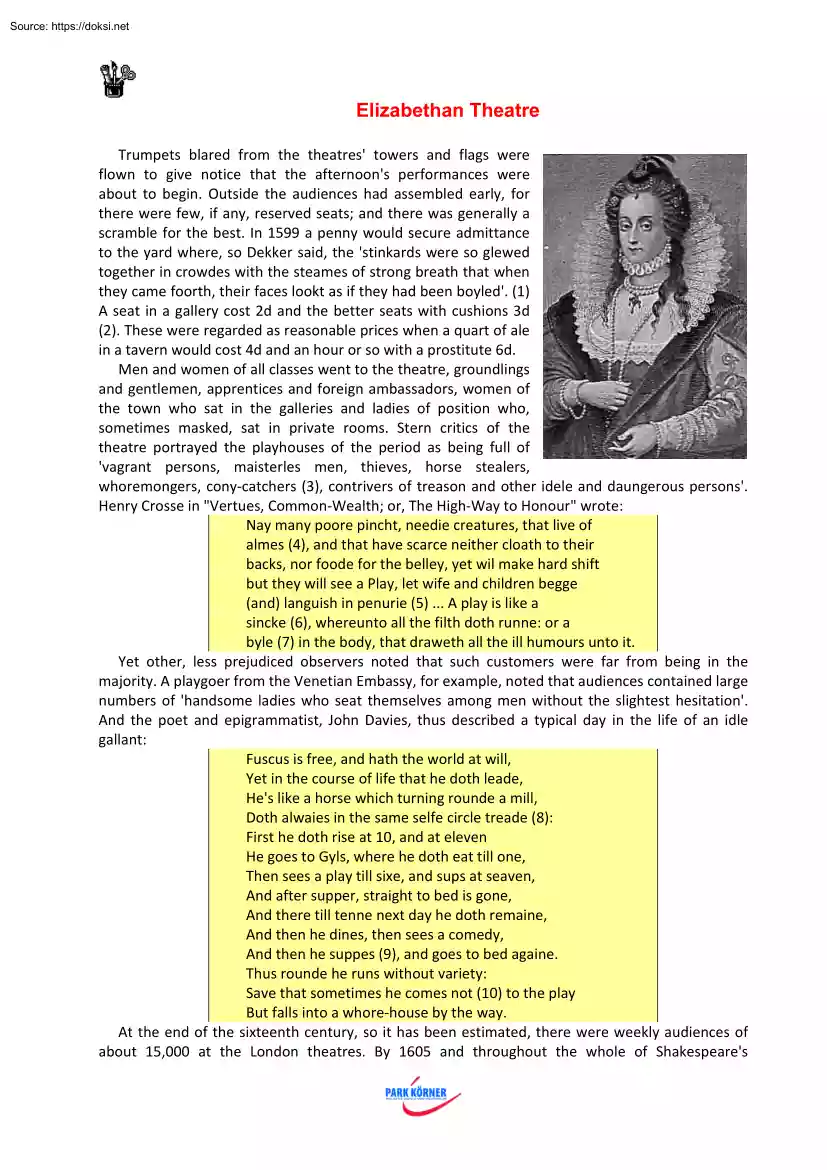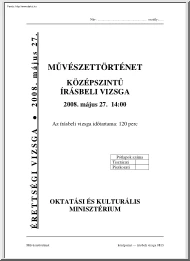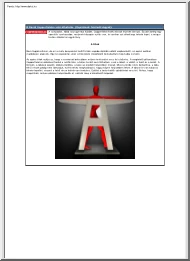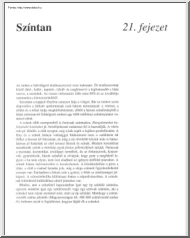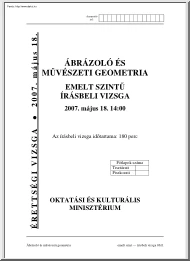Alapadatok
Év, oldalszám:2019, 5 oldal
Nyelv:angol
Letöltések száma:4
Feltöltve:2021. június 28.
Méret:907 KB
Intézmény:
-
Megjegyzés:
Csatolmány:-
Letöltés PDF-ben:Kérlek jelentkezz be!
Értékelések
Nincs még értékelés. Legyél Te az első!Tartalmi kivonat
Elizabethan Theatre Trumpets blared from the theatres towers and flags were flown to give notice that the afternoons performances were about to begin. Outside the audiences had assembled early, for there were few, if any, reserved seats; and there was generally a scramble for the best. In 1599 a penny would secure admittance to the yard where, so Dekker said, the stinkards were so glewed together in crowdes with the steames of strong breath that when they came foorth, their faces lookt as if they had been boyled. (1) A seat in a gallery cost 2d and the better seats with cushions 3d (2). These were regarded as reasonable prices when a quart of ale in a tavern would cost 4d and an hour or so with a prostitute 6d. Men and women of all classes went to the theatre, groundlings and gentlemen, apprentices and foreign ambassadors, women of the town who sat in the galleries and ladies of position who, sometimes masked, sat in private rooms. Stern critics of the theatre portrayed the playhouses
of the period as being full of vagrant persons, maisterles men, thieves, horse stealers, whoremongers, cony-catchers (3), contrivers of treason and other idele and daungerous persons. Henry Crosse in "Vertues, Common-Wealth; or, The High-Way to Honour" wrote: Nay many poore pincht, needie creatures, that live of almes (4), and that have scarce neither cloath to their backs, nor foode for the belley, yet wil make hard shift but they will see a Play, let wife and children begge (and) languish in penurie (5) . A play is like a sincke (6), whereunto all the filth doth runne: or a byle (7) in the body, that draweth all the ill humours unto it. Yet other, less prejudiced observers noted that such customers were far from being in the majority. A playgoer from the Venetian Embassy, for example, noted that audiences contained large numbers of handsome ladies who seat themselves among men without the slightest hesitation. And the poet and epigrammatist, John Davies, thus described a
typical day in the life of an idle gallant: Fuscus is free, and hath the world at will, Yet in the course of life that he doth leade, Hes like a horse which turning rounde a mill, Doth alwaies in the same selfe circle treade (8): First he doth rise at 10, and at eleven He goes to Gyls, where he doth eat till one, Then sees a play till sixe, and sups at seaven, And after supper, straight to bed is gone, And there till tenne next day he doth remaine, And then he dines, then sees a comedy, And then he suppes (9), and goes to bed againe. Thus rounde he runs without variety: Save that sometimes he comes not (10) to the play But falls into a whore-house by the way. At the end of the sixteenth century, so it has been estimated, there were weekly audiences of about 15,000 at the London theatres. By 1605 and throughout the whole of Shakespeares theatrical career, as many as two out of every fifteen of the capitals population were going to the theatre every week. Notified by playbills, which
were set up in prominent positions throughout the city and no doubt at the playhouse doors, and by announcements made after the epilogue of previous performances, the audience impatiently waited for the entertainment to begin, drinking ale, smoking tobacco, sampling the books which were hawked (11) up and down between the seats, playing games of cards, eating fruit and sweetmeats (12), sugarcandy and green ginger, and sending their husbands out for more beer. Before and after the play, and sometimes between the acts, a variety of other entertainments were also commonly provided. These were sometimes as spectacular as the performances at the Bear Garden in Southwark described by a German visitor in August 1584: Dogs were made to fight singly with three bears, the second bear being larger than the first, and the third larger than the second. After this a horse was brought in and chased by the dogs, and at last a bull, who defended himself bravely. The next was, that a number of men and
women came forward from a separate compartment, dancing, conversing and fighting with each other: also a man who threw some white bread among the crowd, that scrambled for it. Right over the middle of the place a rose was fixed, this rose being set on fire by a rocket: suddenly lots of apples and pears fell out of it down upon the people standing below. Whilst the people were scrambling for the apples, some rockets were made to fall upon them out of the rose, which caused a great fright but amused the spectators. After this, rockets and other fireworks came flying out of all corners, and that was the end of the play. As well as fireworks, songs and dumb-shows, prize-fights, dances and the antics (13) of clowns and female tumblers (14) were frequently offered as attractions to accompany the play. There was much contemporary criticism of the rowdy behaviour of theatre audiences; but; in fact, though noisy enough before the play began they seem to have fallen into attentive silence once
the performances started. And, while cutpurses, pickpockets and prostitutes were always on the look-out for likely victims or customers, so they were in all other places where crowds gathered. As Greene warned his readers, pickpockets were at work in all places of resort and assemblies, therefore their chief walks (are) St Pauls, Westminster, the Exchange, plays, bear-garden, (.) The theatre was evidently not a place of special risk or criminality. There is a record only of a stabbing at the Fortune theatre in 1613, but elsewhere in the county of Middlesex that year there were eleven murders, twelve cases of manslaughter, twenty-eight cases of assault and battery, and ten other cases of assault. Audiences did not hesitate to condemn what they took to be displeasing performances, such as that given by a visiting French cast who were hissed, hooted and pippin-pelted (15) from the stage. In the playhouses at London, wrote the author of "Playes Confuted (16) in Five Actions" in
1579, it is the fashion of youthes to go first into the yarde and to carry theire eye through every gallery, then, like unto ravens where they spye the carion (17), thither they flye, and presse as nere to ye (18) fairest as they can. Before the building of the first public theatre in London, plays had generally been performed in the courtyards of inns, and were still occasionally presented in them long after the theatres had been established. The inns had the advantage of ready supplies of hot food and drink and of other entertainments such as those provided by prostitutes and exhibitions of dwarfs, freaks and monsters in private rooms. But they could not compete with the more convenient seating arrangements and the dramatic special effects which the public theatres could provide. The first of these theatres, known simply as The Theatre, was opened in 1576 at Shoreditch, just outside the jurisdiction of the City, by James Burbage, a member of the Earl of Leicesters Company of
Players, and his rich brother-in-law, John Brayne. The next year another theatre was built in Shoreditch. This was the Curtain and was probably financed by an actors syndicate These two theatres were followed by several others, built on the south bank of the river, much to the pleasure and profit of the watermen. Among them were the Swan which, according to a Dutch visitor, had a seating capacity of 3000 and was built of a concrete of flint stones . supported by wooden columns painted in such exact imitation of marble that it might deceive even the most cunning; the Rose, where Edward Alleyn made his reputation as an actor; the Hope and the Globe, a round wooden theatre erected by Richard Burbage and his brother, Cuthbert. Shakespeare was both a player and a shareholder here; and on the stage, where stools were placed for privileged persons, several of his plays were first performed. But shortly before his death, two cannons, fired during a performance of "Henry VIII", set
the thatched roof of the galleries alight and the theatre was destroyed. No one was hurt except for a man who had his breeches (19) on fire that would perhaps have broyled him if he had not with the benefit of a provident wit put it out with bottle ale. It was shortly afterwards rebuilt, however, and was long a prominent feature of the waterfront at Bankside. None of these theatres survived; but from a drawing made by a foreign tourist of the Swan in about 1596 an idea can be formed of their design. The platform-stage, supported on stout columns, jutted out into the unroofed courtyard where the standing spectators surrounded it on three sides. Above the spectators were the circular roofed galleries where the rest of the audience sat. Behind the platform-stage was a wall with doors or curtained doorways giving access backstage and providing exits and entrances for the actors. Above the door was a musicians gallery; and above that the tower which housed the machinery and from which the
flag flew when the theatre was open. The machinery, and the trapdoors in the stage, were vital parts of the theatre, since Elizabethan audiences relished shocks and surprises as much as they did trumpets, thunder and savage realism in bloody scenes of torture and death, which were made all the more horrible by the use of animals entrails (20). They loved to see devils springing up suddenly from hell, and wrathful gods descending from the heavens. They were, as Paul Hentzner discovered, vastly fond of great noises that fill the ear, such as the firing of cannon, drums, and the ringing of bells. When a battle scene was being enacted at the Globe the noise of the guns, the shouts and the clash of arms could be heard on the far bank of the river. The players life was not an easy one. There were celebrated actors who, largely through having a financial investment in a theatre, made large sums of money. Edward Alleyn retired before he was forty, rich enough to buy the manor of Dulwich for
£10,000, to build the College of Gods Gift, and to spend £1700 a year upon its maintenance and that of his own household. And Richard Burbage bequeathed (21) his wife and children land worth £300 as well as valuable shares in both the Blackfriars and Globe theatres. But Richard Tarleton, the ugly comic actor who was renowned for his improvisations and was as celebrated in his day as either Alleyn or Burbage, was a poor man, and so were most of his less famous fellow-players. In the days when plays had been performed in inn-yards most of the profits went to the owners or tenants of the building; and so they did when the first theatres were built. The admission fees were divided between the players and the housekeeper; but when all the actors in a company had received their share and paid their expenses, they did not consider themselves well rewarded for their work. As a writer put it in 1609, Hee shall be glad to play three houres for two pence to the basest stinkard in London,
whose breth is stronger than garlicke, and able to poison all the twelve penny rooms. The rare provident (22) actor was, nevertheless, able to do quite well for himself. The hired men, that is to say those who played the smallest parts, were paid 10s (23) a week by Philip Henslowe, though they received only 5s a week when they were on tour. They were likely to profit additional payments, a special reward for playing well at court, perhaps, or fees for private engagements in the evenings when the public theatres were closed. Moreover, they often had shares in the extensive wardrobe of their respective companies, and in the plays which were written for them. Indeed, their shares in a play were sometimes worth more than the fees the dramatists received for writing them: a play was commonly sold outright for £5 or £6 in Philip Henslowes time, while no more than £2 or £3 was paid for amending an old play for revival. In 1599 Thomas Dekker earned £35; but he had written at least three
successful plays that year and collaborated on several others. When a play was completed, the stage manager would add cues for alarms and noises, prepare a plot - an outline of the story with a list of entrances and exits - and an inventory of the properties required. There was never much in the way of scenery, but a list of properties possessed by Alleyns company includes such items as stairs, steeples (24), a beacon, a tree, a snake, two mossy banks and two coffins, various dead limbs, a tree of golden apples, a cauldron (25) and a dragon. The costumes were always of the most lavish and colourful kind, so resplendent (26) in fact that foreign visitors who could not understand a word of the play derived entertainment in gazing at the very costly dresses of the actors, many of them the discarded but by no means threadbare (27) clothes of lords and ladies. From: Christopher Hibbert, The English, A Social History, 1066 - 1945, London, 1987, chapter: "Actors and Playgoers", pp.
240 (abridged and slightly adapted) (1) Thomas Dekker, The Seven Deadly Sinnes of London, 1606 (2) 2d & 3d: abbreviation for pennies in the old currency twopence (pron: tuppence) and threepence (pron: thruppence) (3) (archaic:) rabbit; the fur was used for making coats (4) alms: donations of money, food or clothes to poor people (5) to languish in penury: to live wretchedly in extreme poverty (6) sink - (here:) a cesspool; normally a washbasin (7) bile: Gallenflüssigkeit (8) note that "to lead" and "to tread" /tred/ are not pronounced in the same way any more. (9) no standardized spelling: suppes = has supper, cf. l42 (10) this form of negation was still grammatically correct in those days (11) offered for sale (12) delicacies preserved in sugar (13) absurd and exaggerated movement (14) acrobats turning somersaults (15) pippin is an apple (16) to confute means to prove to be wrong (17) carrion - dead and decaying flesh (18) press as near/close to the
fairest (19) trousers (20) internal organs, especially the intestines (Eingeweide) (21) left in his will (22) thrifty; providing for his future (23) ten shillings (24) tall towers with spires (25) a large deep pot (26) brilliant with colour and decorations; splendid (27) worn thin, shabby
of the period as being full of vagrant persons, maisterles men, thieves, horse stealers, whoremongers, cony-catchers (3), contrivers of treason and other idele and daungerous persons. Henry Crosse in "Vertues, Common-Wealth; or, The High-Way to Honour" wrote: Nay many poore pincht, needie creatures, that live of almes (4), and that have scarce neither cloath to their backs, nor foode for the belley, yet wil make hard shift but they will see a Play, let wife and children begge (and) languish in penurie (5) . A play is like a sincke (6), whereunto all the filth doth runne: or a byle (7) in the body, that draweth all the ill humours unto it. Yet other, less prejudiced observers noted that such customers were far from being in the majority. A playgoer from the Venetian Embassy, for example, noted that audiences contained large numbers of handsome ladies who seat themselves among men without the slightest hesitation. And the poet and epigrammatist, John Davies, thus described a
typical day in the life of an idle gallant: Fuscus is free, and hath the world at will, Yet in the course of life that he doth leade, Hes like a horse which turning rounde a mill, Doth alwaies in the same selfe circle treade (8): First he doth rise at 10, and at eleven He goes to Gyls, where he doth eat till one, Then sees a play till sixe, and sups at seaven, And after supper, straight to bed is gone, And there till tenne next day he doth remaine, And then he dines, then sees a comedy, And then he suppes (9), and goes to bed againe. Thus rounde he runs without variety: Save that sometimes he comes not (10) to the play But falls into a whore-house by the way. At the end of the sixteenth century, so it has been estimated, there were weekly audiences of about 15,000 at the London theatres. By 1605 and throughout the whole of Shakespeares theatrical career, as many as two out of every fifteen of the capitals population were going to the theatre every week. Notified by playbills, which
were set up in prominent positions throughout the city and no doubt at the playhouse doors, and by announcements made after the epilogue of previous performances, the audience impatiently waited for the entertainment to begin, drinking ale, smoking tobacco, sampling the books which were hawked (11) up and down between the seats, playing games of cards, eating fruit and sweetmeats (12), sugarcandy and green ginger, and sending their husbands out for more beer. Before and after the play, and sometimes between the acts, a variety of other entertainments were also commonly provided. These were sometimes as spectacular as the performances at the Bear Garden in Southwark described by a German visitor in August 1584: Dogs were made to fight singly with three bears, the second bear being larger than the first, and the third larger than the second. After this a horse was brought in and chased by the dogs, and at last a bull, who defended himself bravely. The next was, that a number of men and
women came forward from a separate compartment, dancing, conversing and fighting with each other: also a man who threw some white bread among the crowd, that scrambled for it. Right over the middle of the place a rose was fixed, this rose being set on fire by a rocket: suddenly lots of apples and pears fell out of it down upon the people standing below. Whilst the people were scrambling for the apples, some rockets were made to fall upon them out of the rose, which caused a great fright but amused the spectators. After this, rockets and other fireworks came flying out of all corners, and that was the end of the play. As well as fireworks, songs and dumb-shows, prize-fights, dances and the antics (13) of clowns and female tumblers (14) were frequently offered as attractions to accompany the play. There was much contemporary criticism of the rowdy behaviour of theatre audiences; but; in fact, though noisy enough before the play began they seem to have fallen into attentive silence once
the performances started. And, while cutpurses, pickpockets and prostitutes were always on the look-out for likely victims or customers, so they were in all other places where crowds gathered. As Greene warned his readers, pickpockets were at work in all places of resort and assemblies, therefore their chief walks (are) St Pauls, Westminster, the Exchange, plays, bear-garden, (.) The theatre was evidently not a place of special risk or criminality. There is a record only of a stabbing at the Fortune theatre in 1613, but elsewhere in the county of Middlesex that year there were eleven murders, twelve cases of manslaughter, twenty-eight cases of assault and battery, and ten other cases of assault. Audiences did not hesitate to condemn what they took to be displeasing performances, such as that given by a visiting French cast who were hissed, hooted and pippin-pelted (15) from the stage. In the playhouses at London, wrote the author of "Playes Confuted (16) in Five Actions" in
1579, it is the fashion of youthes to go first into the yarde and to carry theire eye through every gallery, then, like unto ravens where they spye the carion (17), thither they flye, and presse as nere to ye (18) fairest as they can. Before the building of the first public theatre in London, plays had generally been performed in the courtyards of inns, and were still occasionally presented in them long after the theatres had been established. The inns had the advantage of ready supplies of hot food and drink and of other entertainments such as those provided by prostitutes and exhibitions of dwarfs, freaks and monsters in private rooms. But they could not compete with the more convenient seating arrangements and the dramatic special effects which the public theatres could provide. The first of these theatres, known simply as The Theatre, was opened in 1576 at Shoreditch, just outside the jurisdiction of the City, by James Burbage, a member of the Earl of Leicesters Company of
Players, and his rich brother-in-law, John Brayne. The next year another theatre was built in Shoreditch. This was the Curtain and was probably financed by an actors syndicate These two theatres were followed by several others, built on the south bank of the river, much to the pleasure and profit of the watermen. Among them were the Swan which, according to a Dutch visitor, had a seating capacity of 3000 and was built of a concrete of flint stones . supported by wooden columns painted in such exact imitation of marble that it might deceive even the most cunning; the Rose, where Edward Alleyn made his reputation as an actor; the Hope and the Globe, a round wooden theatre erected by Richard Burbage and his brother, Cuthbert. Shakespeare was both a player and a shareholder here; and on the stage, where stools were placed for privileged persons, several of his plays were first performed. But shortly before his death, two cannons, fired during a performance of "Henry VIII", set
the thatched roof of the galleries alight and the theatre was destroyed. No one was hurt except for a man who had his breeches (19) on fire that would perhaps have broyled him if he had not with the benefit of a provident wit put it out with bottle ale. It was shortly afterwards rebuilt, however, and was long a prominent feature of the waterfront at Bankside. None of these theatres survived; but from a drawing made by a foreign tourist of the Swan in about 1596 an idea can be formed of their design. The platform-stage, supported on stout columns, jutted out into the unroofed courtyard where the standing spectators surrounded it on three sides. Above the spectators were the circular roofed galleries where the rest of the audience sat. Behind the platform-stage was a wall with doors or curtained doorways giving access backstage and providing exits and entrances for the actors. Above the door was a musicians gallery; and above that the tower which housed the machinery and from which the
flag flew when the theatre was open. The machinery, and the trapdoors in the stage, were vital parts of the theatre, since Elizabethan audiences relished shocks and surprises as much as they did trumpets, thunder and savage realism in bloody scenes of torture and death, which were made all the more horrible by the use of animals entrails (20). They loved to see devils springing up suddenly from hell, and wrathful gods descending from the heavens. They were, as Paul Hentzner discovered, vastly fond of great noises that fill the ear, such as the firing of cannon, drums, and the ringing of bells. When a battle scene was being enacted at the Globe the noise of the guns, the shouts and the clash of arms could be heard on the far bank of the river. The players life was not an easy one. There were celebrated actors who, largely through having a financial investment in a theatre, made large sums of money. Edward Alleyn retired before he was forty, rich enough to buy the manor of Dulwich for
£10,000, to build the College of Gods Gift, and to spend £1700 a year upon its maintenance and that of his own household. And Richard Burbage bequeathed (21) his wife and children land worth £300 as well as valuable shares in both the Blackfriars and Globe theatres. But Richard Tarleton, the ugly comic actor who was renowned for his improvisations and was as celebrated in his day as either Alleyn or Burbage, was a poor man, and so were most of his less famous fellow-players. In the days when plays had been performed in inn-yards most of the profits went to the owners or tenants of the building; and so they did when the first theatres were built. The admission fees were divided between the players and the housekeeper; but when all the actors in a company had received their share and paid their expenses, they did not consider themselves well rewarded for their work. As a writer put it in 1609, Hee shall be glad to play three houres for two pence to the basest stinkard in London,
whose breth is stronger than garlicke, and able to poison all the twelve penny rooms. The rare provident (22) actor was, nevertheless, able to do quite well for himself. The hired men, that is to say those who played the smallest parts, were paid 10s (23) a week by Philip Henslowe, though they received only 5s a week when they were on tour. They were likely to profit additional payments, a special reward for playing well at court, perhaps, or fees for private engagements in the evenings when the public theatres were closed. Moreover, they often had shares in the extensive wardrobe of their respective companies, and in the plays which were written for them. Indeed, their shares in a play were sometimes worth more than the fees the dramatists received for writing them: a play was commonly sold outright for £5 or £6 in Philip Henslowes time, while no more than £2 or £3 was paid for amending an old play for revival. In 1599 Thomas Dekker earned £35; but he had written at least three
successful plays that year and collaborated on several others. When a play was completed, the stage manager would add cues for alarms and noises, prepare a plot - an outline of the story with a list of entrances and exits - and an inventory of the properties required. There was never much in the way of scenery, but a list of properties possessed by Alleyns company includes such items as stairs, steeples (24), a beacon, a tree, a snake, two mossy banks and two coffins, various dead limbs, a tree of golden apples, a cauldron (25) and a dragon. The costumes were always of the most lavish and colourful kind, so resplendent (26) in fact that foreign visitors who could not understand a word of the play derived entertainment in gazing at the very costly dresses of the actors, many of them the discarded but by no means threadbare (27) clothes of lords and ladies. From: Christopher Hibbert, The English, A Social History, 1066 - 1945, London, 1987, chapter: "Actors and Playgoers", pp.
240 (abridged and slightly adapted) (1) Thomas Dekker, The Seven Deadly Sinnes of London, 1606 (2) 2d & 3d: abbreviation for pennies in the old currency twopence (pron: tuppence) and threepence (pron: thruppence) (3) (archaic:) rabbit; the fur was used for making coats (4) alms: donations of money, food or clothes to poor people (5) to languish in penury: to live wretchedly in extreme poverty (6) sink - (here:) a cesspool; normally a washbasin (7) bile: Gallenflüssigkeit (8) note that "to lead" and "to tread" /tred/ are not pronounced in the same way any more. (9) no standardized spelling: suppes = has supper, cf. l42 (10) this form of negation was still grammatically correct in those days (11) offered for sale (12) delicacies preserved in sugar (13) absurd and exaggerated movement (14) acrobats turning somersaults (15) pippin is an apple (16) to confute means to prove to be wrong (17) carrion - dead and decaying flesh (18) press as near/close to the
fairest (19) trousers (20) internal organs, especially the intestines (Eingeweide) (21) left in his will (22) thrifty; providing for his future (23) ten shillings (24) tall towers with spires (25) a large deep pot (26) brilliant with colour and decorations; splendid (27) worn thin, shabby
